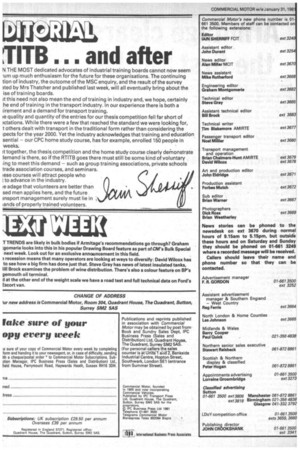TITB and after N THE MOST dedicated advocates of industrial
Page 4

If you've noticed an error in this article please click here to report it so we can fix it.
training boards cannot now seem -urn up much enthusiasm for the future for these organisations. The continuing tion of industry, the outcome of the MSC enquiry, and the result of the survey )ted by Mrs Thatcher and published last week, will all eventually bring about the ise of training boards.
lt this need not also mean the end of training in industry and, we hope, certainly he end of training in the transport industry. In our experience there is both a lirement and a demand for transport training.
ie quality and quantity of the entries for our thesis competition fell far short of )ctations. While there were a few that reached the standard we were looking for, t others dealt with transport in the traditional form rather than considering the ipects for the year 2000. Yet the industry acknowledges that training and education sential — our CPC home study course, has for example, enrolled 150 people in weeks, it together, the thesis, competition and the home study course clearly demonstrate lemand is there, so if the RT1TB goes there must still be some kind of voluntary ling to meet this demand — such as group training associations, private schools trade association courses, and seminars. iese courses will attract people who t to advance in the industry.
ie adage that volunteers are better than sed men applies here, and the future msport management surely must lie in lands of properly trained volunteers.




























































































